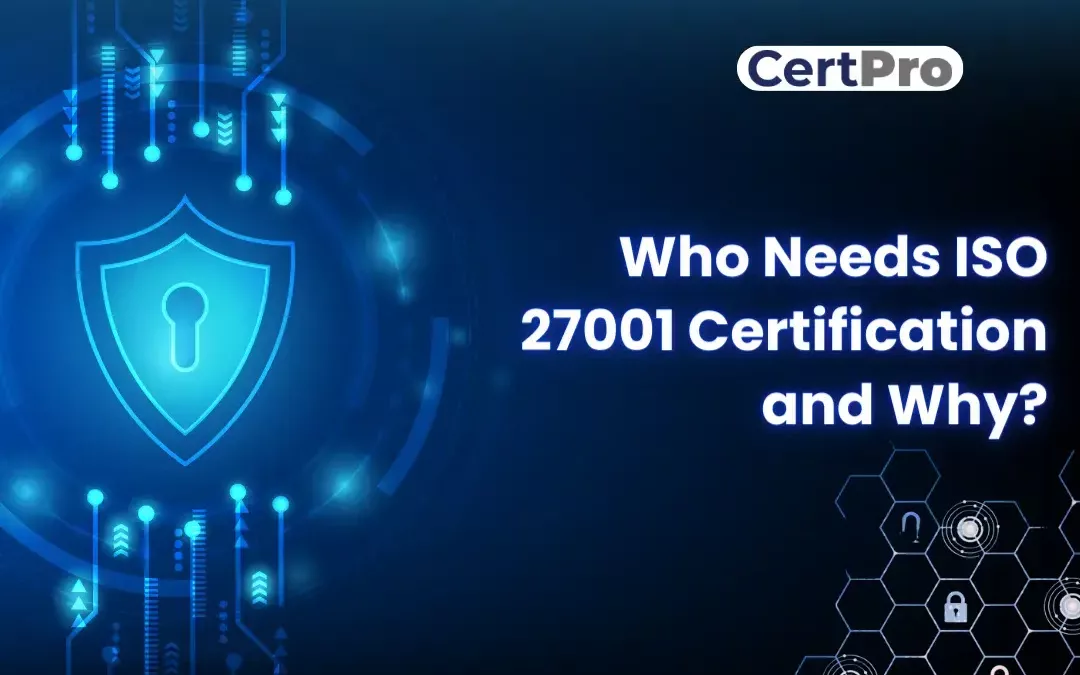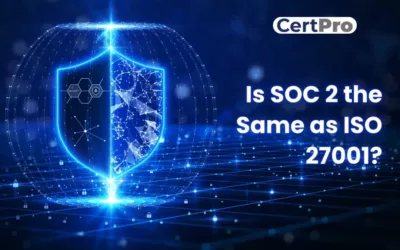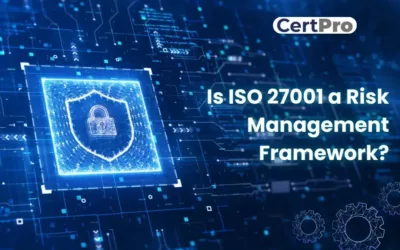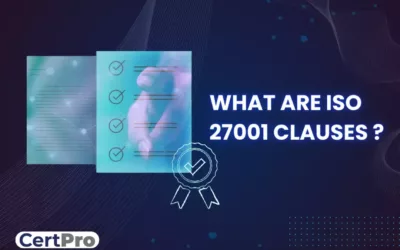The esteemed ISO 27001 security framework is designed to evaluate the effectiveness of an organization’s Information Security Management System (ISMS) in safeguarding its data. Obtaining ISO 27001 certification is a practical way for a corporation to demonstrate its strong information security posture making it an essential consideration for those who needs to be ISO certified. This certification provides reassurance to potential partners, customers, and clients, offering them crucial peace of mind regarding the organization’s commitment to information security.
As part of the certification process, the ISMS is thoroughly evaluated to make sure it complies with international information security requirements. This not only raises the organization’s credibility but also inspires trust in its security measures for sensitive data. ISO 27001 accreditation indicates a dedication to proactive risk management and the maintenance of the highest standards of information security, surpassing mere bureaucratic necessity.
ISO 27001 offers a strategic advantage by encouraging an ongoing culture of improvement in information security processes, which goes beyond compliance. It acts as a standard for businesses trying to stay competitive in a world that is getting more digital and networked by the day. ISO 27001 accreditation transforms into a prestigious emblem, symbolizing a commitment to excellence in information security that resonates with stakeholders globally.
WHAT IS ISO 27001 CERTIFICATION?
The collaboration between the International Organization for Standardization (ISO) and the International Electrotechnical Commission (IEC) resulted in the development of the ISO 27001 standard. This framework serves as a valuable tool for businesses aiming to establish secure systems and showcase their commitment to security through a certification process. ISO 27001 centers around an organization’s Information Security Management System (ISMS), encompassing a set of policies and procedures that delineate how the company safeguards its data.
To attain ISO 27001 certification, a thorough audit is necessary to verify compliance with established requirements and the effective management of potential risks to the system. The standard comprises 10 clauses and 114 controls categorized into 14 sections, each representing potential security measures tailored to an organization’s specific needs and risks. While adherence to all 10 clauses is mandatory, it’s not obligatory to implement the entire list of 114 ISO 27001 controls to achieve certification.
WHO NEED TO BE ISO CERTIFIED?
The primary goal of achieving ISO 27001 certification is to communicate to customers and prospects that your business highly prioritizes security. Although ISO 27001 is not a legal requirement, it may become a prerequisite for engaging in business with certain customers who needs to be ISO certified. This certification is particularly pertinent for organizations dealing with or managing customer data, notably in sectors like SaaS providers, data storage solutions, data processing and analytics tools, and other data-service platforms.
When assessing the need for ISO 27001 certification, it’s crucial to consider the geographical locations of your customers who needs to be ISO certified. SOC 2, a compliance standard similar to ISO 27001, is predominantly used in North America but is gaining international recognition. In contrast, ISO 27001 is an international standard adopted worldwide. For businesses with a global customer base, ISO 27001 is likely to be crucial, given its broader international acceptance.
Many companies find it advantageous to pursue both SOC 2 and ISO 27001 certifications, especially when serving customers in North America and various global locations who needs to be ISO certified. The rationale behind this dual certification often stems from the overlap in controls between the two standards. Consequently, undergoing an audit for both standards simultaneously is a common practice among organizations seeking compliance in multiple regions.
WHICH INDUSTRIES NEED AN ISO 27001 CERTIFICATION?
A key component in protecting an organization’s sensitive data is ISO 27001 certification. Because they deal with sensitive data, the following industries are especially likely to pursue ISO 27001 certification:
1. IT Industry: Data is extremely valuable in the IT and software industries, and it’s often very sensitive. In order to preserve business operations and safeguard the reputation of their brand, companies in this sector must ensure that their data is secure and private. This emphasizes how common it is for these kinds of businesses to implement ISO 27001 compliance. The standard provides a vital foundation that guarantees that these businesses adhere to strict security protocols. This strengthens their capacity to handle the difficulties posed by data protection and reaffirms their dedication to upholding stakeholders’ and clients’ trust.
2. Finance Industry: Security is still one of the biggest concerns in the financial industry, especially considering that most money is now digital. A simple formula change or data deletion might result in significant financial losses that can reach millions of dollars. In light of the financial sector’s vulnerability to cyberattacks, companies should prioritize adhering to ISO 27001 standards. This compliance is essential for maintaining consumer trust, which is critical in an industry where dependability and honesty are highly valued, in addition to strengthening security measures.
3. Healthcare Industry: Almost all of the data in the healthcare industry is extremely sensitive. HIPAA laws outline strict requirements governing the management of healthcare data, and healthcare organizations in the US must adhere to them. ISO 27001 is a useful framework that helps international healthcare organizations set up and demonstrate strong security protocols. In the dynamic world of healthcare data management, this worldwide standard not only makes it easier to maintain security procedures, but it also gives these firms a way to show that they are dedicated to protecting sensitive data.
4. Telecom Industry: As a primary means of data transfer, the telecommunications industry typically serves as a hub for cybercrime activity. Thus, in the telecom sector, making sure that strong security measures are in place is crucial. Obtaining ISO 27001 accreditation is a popular way to show and reinforce this dedication to security. This global standard not only demonstrates the industry’s commitment to protecting sensitive data, but it also acts as a concrete example of the preventative measures taken to reduce cybersecurity threats. Because data transmission plays such a crucial role in an environment where trust is built and maintained, ISO 27001 certification becomes essential.
5. Government Sector: Governmental organizations handle a wide range of sensitive data, including private citizen information, national security intelligence, private policy documents, and other critical resources essential to the country’s functioning. These government agencies require a strong security framework due to their importance and allure as ideal targets for espionage and cyberattacks. Strict precautions must be taken in order to defend sensitive information from hackers, stop data breaches, and guard against unauthorized access. A strong security framework must be established and maintained in order to protect vital resources and guarantee the confidentiality of sensitive data that is essential to the country’s efficient operation.
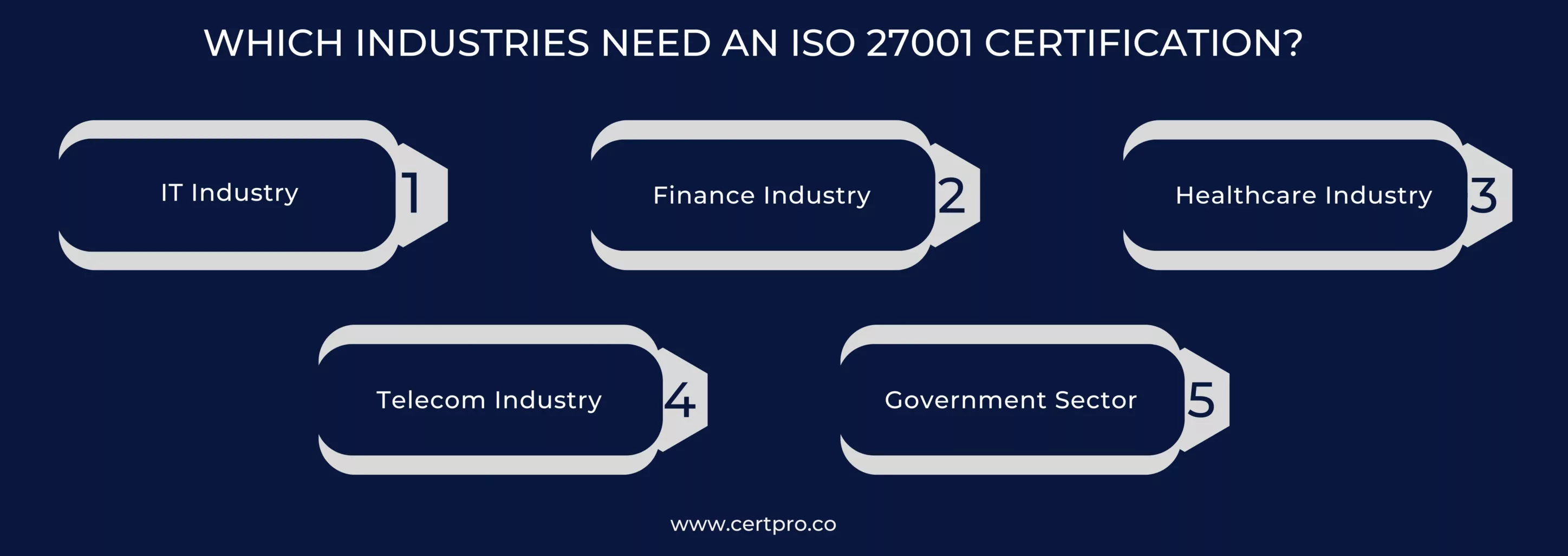
ISO 27001 CERTIFICATION PROCESS
Explore the eight steps involved in the ISO 27001 certification process.
1. Form an ISO 27001 team: Form a dedicated group around ISO 27001 by designating competent workers to lead the certification process. Developing efficient procedures for the documentation of your Information Security Management System (ISMS), getting support from upper management, and working closely with the auditor are just a few of the duties that this team will be in charge of.
2. Extend your ISMS: Before the beginning of creating your ISMS, find out what special kinds of data your company deals with. The ISMS’s scope can include all areas of the company or only certain divisions or systems. Discuss with your team the elements that ought to be included in the scope statement of the ISO 27001 certificate. Choose the platform, service, or product that most interests your target audience first.
3. Finish the risk assessment and put controls in place: Companies are required by ISO 27001 to regularly record their efforts to identify and mitigate potential threats. To identify any threats to your information security, carry out a comprehensive risk assessment within the parameters of ISO 27001. Evaluate each identified risk in terms of its likelihood and severity of effects.
After the risk assessment is finished, record the steps you took to address each risk that was found. Improve your Information Security Management System (ISMS) by adding targeted mitigation techniques for each risk that your research uncovers.
4. Collect and record evidence: Invest time and energy in strengthening your documentation in advance of the audit to increase your chances of achieving ISO 27001 certification. It is best to start the process early because manual documentation can present some difficulties. As a trial run for the real certification audit, think about performing an internal audit.
The entire staff should be educated about information security, the Information Security Management System (ISMS), and the ins and outs of ISO 27001 certification by the ISO 27001 team during this preparatory phase. By encouraging teamwork among your employees, you dramatically reduce the possibility that important details will be missed and your ISMS will have gaps.
5. Finish the stage 1 audit: After implementing your Information Security Management System (ISMS) through around four months of preparation, you are ready to engage an outside auditor to assess it. The ISO-accredited certification authority that will provide your ISO 27001 auditor is the source.
6. Implement the stage 1 audit findings: Resolve any issues the auditor found with your information security management system (ISMS). Completely record and execute any information security controls that are lacking.
7. Conduct a stage 2 audit: An information security management system (ISMS) auditor will carefully examine the operation of your information security safeguards during this assessment to make sure that your procedures follow the guidelines. It is crucial that the procedures that have been documented are followed in practice as well as on paper. After the Stage 2 audit is successfully completed, you will receive ISO 27001 certification, which is valid for three years.
8. Maintain ISO 27001 compliance: Once ISO 27001 certification has been achieved, schedule regular internal audits. Organizations are required by ISO 27001 to do an annual “surveillance audit” in order to confirm that their Information Security Management System (ISMS) is still in compliance.
After the third year, you can renew your ISO 27001 certification for an additional three years by going through a recertification audit. This procedure guarantees a consistent dedication to an ISMS that complies.
FAQ
Who needs to be ISO certified, and is it a legal requirement?
ISO 27001 certification is not a legal requirement, but it is essential for organizations dealing with sensitive data, especially in sectors like SaaS, data storage, and data processing. It becomes a prerequisite for engaging in business with customers who prioritize working with ISO-certified partners.
What is the ISO 27001 certification process?
The ISO 27001 certification process involves eight key steps, including forming an ISO 27001 team, defining the ISMS scope, conducting risk assessments, implementing controls, collecting evidence, undergoing Stage 1 and Stage 2 audits, and maintaining ongoing compliance.
Which industries need ISO 27001 requirements?
Industries dealing with sensitive data, such as IT, finance, healthcare, telecom, and government, benefit significantly from ISO 27001 certification. It establishes a strong security foundation, addresses industry-specific challenges, and enhances trust among stakeholders.
What is the ISO 27001 certification process?
The ISO 27001 certification involves eight key steps, including forming an ISO 27001 team, defining the ISMS scope, conducting risk assessments, implementing controls, collecting evidence, undergoing Stage 1 and Stage 2 audits, and maintaining ongoing compliance.
What are the core components of ISO 27001 requirements?
The core components of ISO 27001 requirements include risk assessment and management, the establishment of an ISMS, defining the scope of the system, leadership commitment, documented information management, and continual monitoring and improvement. These elements collectively contribute to building a robust framework for information security.

About the Author
GANESH S
Ganesh S, an expert in writing content on compliance, auditing, and cybersecurity, holds a Bachelor of Arts (BA) in Journalism and Mass Communication. With a keen eye for detail and a knack for clear communication, Ganesh excels in producing informative and engaging content in the fields of compliance, auditing, and cybersecurity, with particular expertise in ISO 27001, GDPR, SOC 2, HIPAA, and CE Mark.
IS SOC 2 THE SAME AS ISO 27001?
In today's digital landscape, ensuring the safeguarding of client data is paramount for businesses. Adhering to recognized compliance standards is vital to meeting this demand. ISO 27001 vs. SOC 2 represent two prominent benchmarks in the realm of data security with...
IS ISO 27001 RISK ASSESSMENT VITAL FOR SECURITY MEASURES?
The ISO 27001 standard provides a framework for information security, highlighting the importance of a thorough risk assessment procedure. Organizations use the methodical and complex ISO 27001 risk assessment process to identify and assess information security...
WHAT ARE ISO 27001 CLAUSES
ISO 27001 clauses, a worldwide recognized standard, play an essential role in helping enterprises develop strong information security management systems (ISMS). This organized framework ensures a thorough defense against potential threats and weaknesses by offering a...

